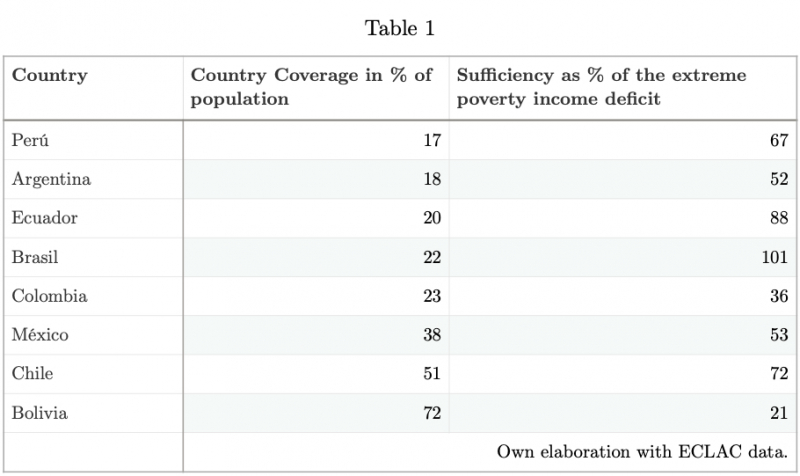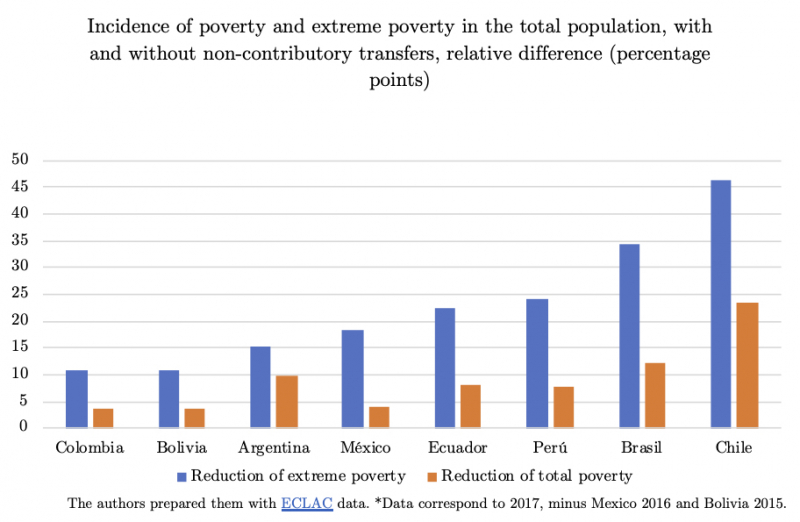This article analyses the situation and challenges of non-contributory social protection systems as income guarantee instruments in Latin America. Although a wide variety of techniques differ in their intensity of coverage and the level of income they cover, their positive impact is demonstrated. Yet, they still need to achieve the minimum objective of eradicating extreme poverty.
Conditional Cash Transfer (CCT) programmes emerged in several Latin America and the Caribbean regions in the late 1990s. It was in response to two significant changes: the debt crisis and the subsequently lost decade and democratisation processes that followed. The Progresa programme in Mexico in 1997, supported by the IMF, the World Bank and the Inter-American Development Bank, laid the foundations for these kinds of benefits worldwide. Since then, these policies have advanced in most Latin American countries and have been vital emergency policies during COVID-19 around the world.
In countries with little social protection in formal work, non-contributory cash transfers are necessary. These, unlike contributory ones, are cash payments from the state to individuals without prior contributions. In Mexico, for example, only 40% of the employed population had retirement savings in 2022. There is no national unemployment insurance. Mexico City has one but it will cover only 13,000 people in 2023, 0.27% of the working population. In 2017, 56.1% of those over 15 declared that they had not contributed, i.e. 51.3 million working-age people had not made contributions that year. In this context, non-contributory cash benefits function like unemployment insurance and contributory pensions in countries with formal jobs and high wages. Their expansion reflects the need for economic dynamics to absorb the labour force with stable and quality jobs.
In Latin America, many programmes offer access to income to the population, but CCTs and non-contributory pensions are the main ones. There are two aspects to assess their impact: coverage (the number of beneficiaries) and sufficiency (their capacity to lift households out of poverty).

This table shows excellent heterogeneity between the countries analysed regarding coverage and sufficiency. Some have expanded range but with low amounts, such as Bolivia, and others have focused resources with more money, such as Brazil and Ecuador. The four countries with high informality and strong protests, Peru (70.1%), Ecuador (63.5%), Brazil (47.1%) and Bolivia (84.9%)[1], have evident deficits in one of the two dimensions. However, it is generalisable that none of these countries has guaranteed a minimum income level for the vulnerable population. Even the most successful in reducing extreme poverty with these programmes, such as Brazil and Chile, only reduce it by 35% and 45%, respectively

Food inflation and the slowdown could worsen the situation in 2023. ECLAC projects that extreme poverty will affect 13.8% of the region's population in 2023, 3.5% more than before the pandemic. In this context, alternatives such as the proposed Universal Basic Income (IBU) are gaining ground. It is a non-contributory transfer system that grants an income to the entire population, individually and unconditionally. Its financing is undoubtedly the most important political and economic challenge.
According to the Centro de Investigación en Alimentación y Desarrollo (CIAD, 2022), an IBU of 92 USD per month would increase Mexico's social spending by 6.98%, equivalent to 1.5% of GDP. Such an IBU would eliminate extreme poverty and lower moderate poverty from 41.9% to 12.4%. Thus, Mexico's public spending would go from 26% to 32.9%. It is still far from the level of Brazil (37.5%), Argentina (37.7%), or Ecuador (37.1%), but close to the level of Colombia (32%). It would allow Mexico to move away from the countries analysed with the most significant public spendings deficits, such as Peru (21.1%) and Chile (26.5%) (Data 2019, IMF).
In conclusion, non-contributory social protection systems in Latin America have been critical instruments for guaranteeing income for the vulnerable population. However, they still have to overcome substantial challenges to achieve universal coverage and sufficiency to eradicate extreme poverty. The IBU proposals, although costly, seem a reasonable and practical option to cover these gaps in Latin American countries. These transfers are not substitutes for development and formal employment policies but a necessity for an adequate social protection system in the face of a structural labour market scenario that is incapable of absorbing the labour force and therefore promotes migration and informal and illegal activities.
[1] Informal employment as a percentage of total employment, ILO









